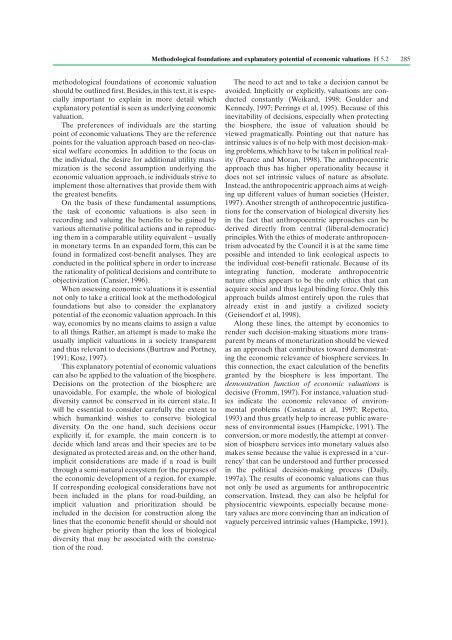Conservation and Sustainable Use of the Biosphere - WBGU
Conservation and Sustainable Use of the Biosphere - WBGU
Conservation and Sustainable Use of the Biosphere - WBGU
You also want an ePaper? Increase the reach of your titles
YUMPU automatically turns print PDFs into web optimized ePapers that Google loves.
Methodological foundations <strong>and</strong> explanatory potential <strong>of</strong> economic valuations H 5.2<br />
285<br />
methodological foundations <strong>of</strong> economic valuation<br />
should be outlined first. Besides, in this text, it is especially<br />
important to explain in more detail which<br />
explanatory potential is seen as underlying economic<br />
valuation.<br />
The preferences <strong>of</strong> individuals are <strong>the</strong> starting<br />
point <strong>of</strong> economic valuations. They are <strong>the</strong> reference<br />
points for <strong>the</strong> valuation approach based on neo-classical<br />
welfare economics. In addition to <strong>the</strong> focus on<br />
<strong>the</strong> individual, <strong>the</strong> desire for additional utility maximization<br />
is <strong>the</strong> second assumption underlying <strong>the</strong><br />
economic valuation approach, ie individuals strive to<br />
implement those alternatives that provide <strong>the</strong>m with<br />
<strong>the</strong> greatest benefits.<br />
On <strong>the</strong> basis <strong>of</strong> <strong>the</strong>se fundamental assumptions,<br />
<strong>the</strong> task <strong>of</strong> economic valuations is also seen in<br />
recording <strong>and</strong> valuing <strong>the</strong> benefits to be gained by<br />
various alternative political actions <strong>and</strong> in reproducing<br />
<strong>the</strong>m in a comparable utility equivalent – usually<br />
in monetary terms. In an exp<strong>and</strong>ed form, this can be<br />
found in formalized cost-benefit analyses. They are<br />
conducted in <strong>the</strong> political sphere in order to increase<br />
<strong>the</strong> rationality <strong>of</strong> political decisions <strong>and</strong> contribute to<br />
objectivization (Cansier, 1996).<br />
When assessing economic valuations it is essential<br />
not only to take a critical look at <strong>the</strong> methodological<br />
foundations but also to consider <strong>the</strong> explanatory<br />
potential <strong>of</strong> <strong>the</strong> economic valuation approach. In this<br />
way, economics by no means claims to assign a value<br />
to all things. Ra<strong>the</strong>r, an attempt is made to make <strong>the</strong><br />
usually implicit valuations in a society transparent<br />
<strong>and</strong> thus relevant to decisions (Burtraw <strong>and</strong> Portney,<br />
1991; Kosz, 1997).<br />
This explanatory potential <strong>of</strong> economic valuations<br />
can also be applied to <strong>the</strong> valuation <strong>of</strong> <strong>the</strong> biosphere.<br />
Decisions on <strong>the</strong> protection <strong>of</strong> <strong>the</strong> biosphere are<br />
unavoidable. For example, <strong>the</strong> whole <strong>of</strong> biological<br />
diversity cannot be conserved in its current state. It<br />
will be essential to consider carefully <strong>the</strong> extent to<br />
which humankind wishes to conserve biological<br />
diversity. On <strong>the</strong> one h<strong>and</strong>, such decisions occur<br />
explicitly if, for example, <strong>the</strong> main concern is to<br />
decide which l<strong>and</strong> areas <strong>and</strong> <strong>the</strong>ir species are to be<br />
designated as protected areas <strong>and</strong>, on <strong>the</strong> o<strong>the</strong>r h<strong>and</strong>,<br />
implicit considerations are made if a road is built<br />
through a semi-natural ecosystem for <strong>the</strong> purposes <strong>of</strong><br />
<strong>the</strong> economic development <strong>of</strong> a region, for example.<br />
If corresponding ecological considerations have not<br />
been included in <strong>the</strong> plans for road-building, an<br />
implicit valuation <strong>and</strong> prioritization should be<br />
included in <strong>the</strong> decision for construction along <strong>the</strong><br />
lines that <strong>the</strong> economic benefit should or should not<br />
be given higher priority than <strong>the</strong> loss <strong>of</strong> biological<br />
diversity that may be associated with <strong>the</strong> construction<br />
<strong>of</strong> <strong>the</strong> road.<br />
The need to act <strong>and</strong> to take a decision cannot be<br />
avoided. Implicitly or explicitly, valuations are conducted<br />
constantly (Weikard, 1998; Goulder <strong>and</strong><br />
Kennedy, 1997; Perrings et al, 1995). Because <strong>of</strong> this<br />
inevitability <strong>of</strong> decisions, especially when protecting<br />
<strong>the</strong> biosphere, <strong>the</strong> issue <strong>of</strong> valuation should be<br />
viewed pragmatically. Pointing out that nature has<br />
intrinsic values is <strong>of</strong> no help with most decision-making<br />
problems, which have to be taken in political reality<br />
(Pearce <strong>and</strong> Moran, 1998). The anthropocentric<br />
approach thus has higher operationality because it<br />
does not set intrinsic values <strong>of</strong> nature as absolute.<br />
Instead, <strong>the</strong> anthropocentric approach aims at weighing<br />
up different values <strong>of</strong> human societies (Heister,<br />
1997). Ano<strong>the</strong>r strength <strong>of</strong> anthropocentric justifications<br />
for <strong>the</strong> conservation <strong>of</strong> biological diversity lies<br />
in <strong>the</strong> fact that anthropocentric approaches can be<br />
derived directly from central (liberal-democratic)<br />
principles. With <strong>the</strong> ethics <strong>of</strong> moderate anthropocentrism<br />
advocated by <strong>the</strong> Council it is at <strong>the</strong> same time<br />
possible <strong>and</strong> intended to link ecological aspects to<br />
<strong>the</strong> individual cost-benefit rationale. Because <strong>of</strong> its<br />
integrating function, moderate anthropocentric<br />
nature ethics appears to be <strong>the</strong> only ethics that can<br />
acquire social <strong>and</strong> thus legal binding force. Only this<br />
approach builds almost entirely upon <strong>the</strong> rules that<br />
already exist in <strong>and</strong> justify a civilized society<br />
(Geisendorf et al, 1998).<br />
Along <strong>the</strong>se lines, <strong>the</strong> attempt by economics to<br />
render such decision-making situations more transparent<br />
by means <strong>of</strong> monetarization should be viewed<br />
as an approach that contributes toward demonstrating<br />
<strong>the</strong> economic relevance <strong>of</strong> biosphere services. In<br />
this connection, <strong>the</strong> exact calculation <strong>of</strong> <strong>the</strong> benefits<br />
granted by <strong>the</strong> biosphere is less important. The<br />
demonstration function <strong>of</strong> economic valuations is<br />
decisive (Fromm, 1997). For instance, valuation studies<br />
indicate <strong>the</strong> economic relevance <strong>of</strong> environmental<br />
problems (Costanza et al, 1997; Repetto,<br />
1993) <strong>and</strong> thus greatly help to increase public awareness<br />
<strong>of</strong> environmental issues (Hampicke, 1991). The<br />
conversion, or more modestly, <strong>the</strong> attempt at conversion<br />
<strong>of</strong> biosphere services into monetary values also<br />
makes sense because <strong>the</strong> value is expressed in a ‘currency’<br />
that can be understood <strong>and</strong> fur<strong>the</strong>r processed<br />
in <strong>the</strong> political decision-making process (Daily,<br />
1997a). The results <strong>of</strong> economic valuations can thus<br />
not only be used as arguments for anthropocentric<br />
conservation. Instead, <strong>the</strong>y can also be helpful for<br />
physiocentric viewpoints, especially because monetary<br />
values are more convincing than an indication <strong>of</strong><br />
vaguely perceived intrinsic values (Hampicke, 1991).

















